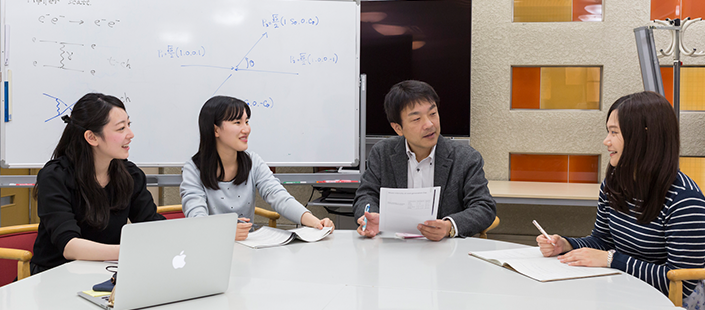- Top
- Physics
ページの本文です。

Physics
Physics
A Cumulation of Theories and Experiments, Hypotheses and Proofs
All to Find the Eternal Truths That Lie Beyond
The eternal truths that created the universe transcend time and space, appearing throughout the world in a variety of forms.
Truth is discovered by modeling and creating theories to explain the phenomena that occur in the natural world, predicting new phenomena, and confirming them in experiments.
This is how physics has developed as a discipline based on empirical proofs. The world of physics is both stimulating and fun. Scientists explore unchanging truths, uncover the secrets of matter and the universe, and take on the challenge of creating the unknown.
Research in the Physics program covers a wide range of areas, including the theory of elementary particles, astrophysics, statistical mechanics, physical property theory, spectroscopic experiments, extreme states, superconductivity and soft matter, and the program provides a highly focused education with small class sizes.
Objective: To Become a Physics Professional
Through a system of education and research that is coherent from the basics of physics to its applications, this program cultivates the ability to intuitively and theoretically explore physical phenomena from the directions of both theory and experimentation. This is not limited to just improvements in physics research skills. This also means that students attain the ability to discover and apply the principles that govern things, and an excellent ability to see and resolve the problems that occur in various aspects of life from a reductionist and multidimensional perspective.
This program seeks to foster women who will lead the next era in different areas of society through multifaceted physics education and research. Approximately 70 percent of our graduates go on to graduate school either at this university or another, continuing their investigations as researchers or in other positions. After graduation, students work in a wide variety of fields, including manufacturing, the information industry, teaching, publishing and universities and other research institutions.
Features: The Joys of Participating in Cutting-Edge Physics Research
Students start taking specialized physics classes during their first year. Second-year students begin conducting experiments that confirm basic aspects of physics. Third-year students apply these skills and conduct introductory experiments into the latest research in superconductivity, chaos, atomic force microscopy and so on to cultivate a methodological mindset and a solid grasp of fundamentals. Fourth-year students conduct special research by joining laboratories where they can experience the thrill of doing physics. Students can also join laboratories from the second semester of their third year to get into cutting-edge research from an early stage if they so choose. In addition, advanced students may take this university’s graduate school master’s program after finishing their third year.
Students have a wide range of options for studying physics from different perspectives, such as by transferring credits to or from other universities, as well as by studying abroad.
Mathematical Methods in Physics I
This course focuses on the mathematics related to first- and second-year courses in mechanics, electromagnetics, quantum mechanics, thermal physics and statistical mechanics. The goal is to have students use mathematics as a tool, with an emphasis on cultivating the ability to calculate and understand intuitively.
Quantum Mechanics I
Students gain an understanding of quantum mechanics, which is the foundation of modern physics. Goals include the comprehension of physical quantities and how to perceive states, the measurement of physical quantities, the uncertainty principle, and the Heisenberg equation.
Thermal Physics
This course logically expands upon the fundamentals of thermal physics, which can universally describe physicochemical phenomena of the macroscopic world such as the exchange of heat. The goal is to enable students to learn the principles of thermal physics and understand the concept and meaning of entropy.
Elementary Physics Experiments
Students handle basic laboratory equipment themselves, conducting physics experiments such as the measurement of basic physical quantities related to mechanics, electromagnetism, electrical circuits, thermal physics and condensed matter physics.
Exercise on Statistical Mechanics
This seminar teaches students how to understand and use the basic principles of statistical mechanics, which involves extracting limited macroscopic variables from dynamic systems with multiple degrees of freedom indicating fluctuation, and how to describe them as stochastic processes.
Physics of Continuous Media
This course lets students closely observe fascinating phenomena related to liquids and elastic bodies in experimental videos or actual experiments, after which they experience the joy of understanding the physics of these phenomena through simple formulas.







